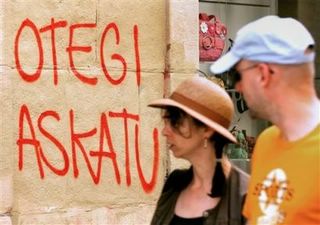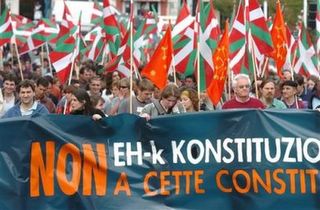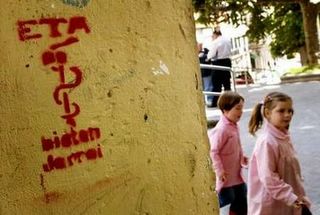A few weeks ago I read an article on the Serbian press that claimed a diplomatic effort to grant Kosovo independence was underway.
I dismissed it, after all, it was the Serbian press, and well, you get used to drivel like that coming from places like Belgrade or Madrid.
I was sorely mistaken, just a couple of days ago I read the footnote to a picture taken in Kosovo that read: "The West hopes to open talks later this year on whether Kosovo becomes independent - as the 90-percent Albanian majority demands - or remains formally part of Serbia."
And it slapped me on the face.
It is actually happening, they will grant independence to Kosovo, and all that talk about the unity of the nation-states, all that talk about doing anything possible to prevent the Balkans from erupting into violence, all that talk about not allowing nationalities vying for independence that harbor armed groups among them to get away with what they demand, all that was nothing but lies.
And to hell with Euskal Herria, Catalonia, Corsica, Brittany and all the other European nationalities without state.
That simple footnote is very telling of all the hypocrisy and double standard in today's politics, a lack of consistency that leaks to all the main media outlets.
There is a country called Albania, and believe it or not, it is inhabitated by Albanians.
If independence is granted to Kosovo, then they will be free to join Albania, which in turn will tell the Albanians living in Macedonia that they too can split from that nation and join the long held dream of a Greater Albania. And then there is sizable Albanian communities in northern Greece and in southern Croatia, so the forecast here is that the West will continue to facilitate the transfer of territories from all neighboring countries, and I'm thinking here that they will all say yes, just go ahead.
Recipe for disaster if you ask me, only a fool would think that the Serbians will be the only ones to be against the idea.
But check this part: "as the 90-percent Albanian majority demands".
Whoa!
Meaning 90% of people described as "ethnic" Albanians. Not Serbians of Albanian background, no, no, no, ethnic Albanians.
If the Basques would dare to say something nowhere close to that they would be called racists or something similar.
Can we say that in the past elections in Euskal Herria 90% of the Basques voted for the pro-independence parties (PNV, EA, Aralar and EHAK), while the Spaniards voted for the PSOE and the PP?
In that case, if the Alabanians are to the Basques what the Spaniards are to the Serbians, then, the West has more redrawing of borders to do.
Oh no, but wait, the Basques allow ETA to act with impunity, and well, the KLA/NLA are sisters of charity planting flowers and building amusement parks for Serbian and Macedonian children.
But Kosovo always belonged to the Albanians since the dawn of times, some will claim.
Yes, and the Basques arrived in Euskal Herria just 50 years ago.
What about the claim that Euskal Herria does not have the economic potential to be independent?
Albania is the poorest country in Europe, while Euskal Herria (and Catalonia for that matter) are two of the richest regions in Europe!
Darn, I'm about to lose my faith on the almighty West.
*Here you have a couple of news articles to bring you up to speed:
Bush Has Plan to Act on the Status of Kosovo
Kosovo Faces Renewed War
Report: UN Mission in Kosovo a Farce



















